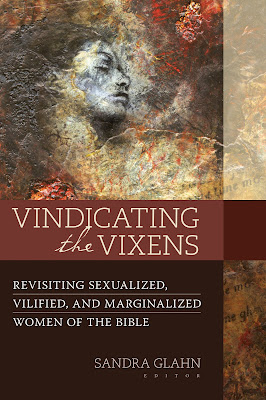Did Bathsheba have a #MeToo story?
Team of Bible scholars helps readers gain a
greater understanding of gender in the Bible
Bathsheba, Tamar,
Rahab, Hagar, and the Samaritan woman at the well—were they really the bad
girls of the Bible or simply women whose situations were greatly misunderstood?
In Vindicating
the Vixens: Revisiting Sexualized, Vilified, and Marginalized Women of the
Bible (Kregel Academic/December 8,
2017/ISBN: 978-0825444135/$22.99), sixteen writers, alongside general editor Sandra Glahn, take a closer look at the
stories of these and other prominent women to help readers gain a better
understanding of these women’s God-given roles in the biblical narrative.
The
church has a long history of viewing notable women of the Bible through a
skewed interpretive lens. For example, Eve is best known for causing the fall,
Sarah is blamed for tensions in the Middle East, Ruth acted scandalously on the
threshing floor, and Mary Magdalene is infamous for a life of prostitution. However,
do these common representations accurately reflect what Scripture says about
these women of the Bible?
While many studies have been written about
the women of the Bible, Vindicating the
Vixens takes a different approach. The book has been on the heart and mind
of Glahn for more than a decade. “While serving as editor-in-chief of Dallas
Theological Seminary’s magazine for seventeen years, I became acquainted with
the writing and research of men and women from a cross-section of multiple
societies who brought perspectives to some biblical stories that seemed truer
to the original than what is typically taught in the West,” she explains. “Then,
as I studied history and ancient cultural backgrounds at the doctoral level, I
ended up revisiting some of our western-influenced interpretations of
circumstances such as marriage practices in the ancient Near East.”
Glahn and the international team of both male
and female scholars challenge these superficial treatments and contend we have
often missed what biblical authors intended to convey about notable women of
Scripture. While the tendency has been to sexualize (as in the case of
Bathsheba and Rahab), vilify (like Hagar and Tamar), and marginalize (the
Virgin Mary, for example) them, Scripture speaks to God’s concern for their
outsider status. The authors contend that by misinterpreting these women’s
stories, we also run the risk of adopting a faulty view of God and His mission
in the world. The writers hope to help recover God’s heart for the vulnerable,
the powerless, and the outsider.
In approaching scripture, the contributors
bring six questions to each text:
1.
What does the text actually say?
2.
What do I observe in and about the text?
3.
What did this text mean to the original
audience?
4.
What was the point?
5.
What truths in this text are timelessly
relevant?
6.
How does the part fit the whole?
“This is not some book written by theologically liberal,
wannabe scholars attempting to be politically correct or manipulating the text
in order to be culturally relevant,” Henry Rouse writes. “The contributors to
this book love God’s Word. And we don’t see our task as reinterpreting the text
to make it more relevant or more acceptable than it already is—as if that were
possible. Our goal is simply to study it and make sure we are being faithful to
it.”
Learn
more about Vindicating the Vixens at Kregel.com.
Advance Praise
“I
always love the stories of God’s daughters in the Bible—God’s storybook of the
relentless love and pursuit of His people. I especially love when the fuller
stories open our eyes to surprising realities. In Vindicating the Vixens, Sandra Glahn has pulled together a treasure
trove of those stories, written with careful theology, cultural comprehension,
and captivating narrative. I can name a few of my favorites—Eve, Ruth, Deborah,
Mary Magdalene—but truly, I loved getting to know every one of these too-often
maligned sisters better. And so will you, I’m sure.”
~
Judy Douglass, Writer, Speaker, Encourager, Director of Women’s Resources, Office
of the President, Cru
“Vindicating the Vixens is a monumentally
important work in that it confronts the prevalent misinterpretations of some of
the most critical women in Scripture. The faithful and meticulous research of
Dr. Glahn and the contributing authors advances the powerful message of the book—God’s
passion for the marginalized, the misunderstood, and the outsider. This book
will challenge the way you look at women, both those in the Bible and those you
meet every day.”
~
Paul Lanum, Vice President of Publishing, RightNow Media
About
the editor
Sandra
Glahn, Th.M., PhD, is a professor in
Media Arts and Worship at Dallas Theological Seminary (DTS) where she teaches
courses on the arts, gender, and human sexuality. She holds a Master of
Theology degree from DTS and a Ph.D. in The Humanities—Aesthetic Studies—from
the University of Texas at Dallas.
Dr. Glahn is author or coauthor of more than twenty
books, including ten Bible studies in the Coffee Cup Bible Study series and both
fiction and non-fiction relating to bioethics, sexuality, and reproductive
technologies. She served as the general editor of her most recent publication, Vindicating the Vixens: Revisiting
Sexualized, Vilified, and Marginalized Women of the Bible (Kregel
Academic).
She is a regular blogger at Engage, Bible.org’s site
for women in Christian leadership, is the owner of Aspire Productions, and
previously served as editor-in-chief for Kindred
Spirit.
Dr. Glahn and her husband, Gary, live in the Dallas
area.
Learn
more at www.aspire2.com and follow Dr. Glahn on Facebook (Aspire2) and Twitter (@sandraglahn).


Comments